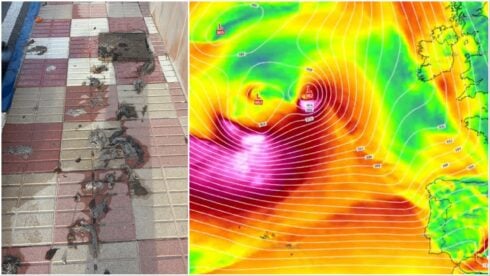BLACKPOOL-BORN John sits outside Malaga-Costa del Sol airport reading No Time to Cry, a thriller novel by James Oswald.
On his airport trolley turned make-shift portable home, he has several books stacked up. “I always have a book,” he says.
John has been homeless in Malaga for ten years. “I originally came for a holiday, and then decided to stay. It was as simple as that.”
The airport has been his temporary home on and off for the last decade. “I get a small pension from the UK, but it’s not enough to live on permanently, so when the money runs out, I come here,” he says.
READ MORE: Homeless people in Malaga airport ‘mostly foreign and refuse paid flights home’
As of 2022, more than 28,000 people were homeless in Spain, a figure which NGOs say has increased to more than 40,000 this year.
John says he feels safe at the airport, and there’s ‘never any trouble.’
After a Catholic charity, Mesa de la Hospitalidad, carried out the first ever census of homeless people sleeping at Madrid’s Barajas Airport, up to 500 individuals were found making Terminal 4 a makeshift home. Just a decade ago, that number was 40.
In response, Spain’s airport operator AENA authorised a crackdown.
Starting on May 21, limits were placed on who could enter the Spanish capital’s airport between the hours of 11pm and 4am.
Malaga Airport, which sees between 15 to 50 homeless people, including John, finding shelter each night, soon followed suit.
Airports are exclusively designed and equipped for passenger traffic and not for people to live there,” Aena spokesperson Pepa Villalobos Cantos said. “Local and regional authorities are aware of this reality. They are working to improve the homeless situation.”
She said access to the terminal would require presenting a valid boarding pass or a justified and accredited reason for entering the airport.
In reality though, John says, the rules aren’t being enforced at Malaga Airport. He hasn’t had to sleep outside yet.
“I think as long as you’re not causing any problems, then they have no reason to shift us out. We are being polite and keeping to ourselves,” he says.
He explained that those passing through the airport to board and disembark from flights rarely interact with him or the other homeless people.
“There are quite a few people actually who live here,” John says. “So we all tend to stick together.”
They can be hard to spot, their luggage trolleys stacked high with baggage camouflaged amongst the travellers.
John says he wouldn’t return to the UK as there’s nothing there for him. “I tend to look after myself, and I’m fairly independent.”
AENA confirmed that they do not move those homeless who are already inside the airport at 11pm.
The Olive Press also spoke to two airport security guards. “You can invite the people to leave, but you can’t force them because they haven’t committed a crime,” one said. “We don’t have many problems here, whereas in Madrid, it’s been worse with fighting and prostitution.”
An AENA spokesperson said in the last two months, although they do not have exact numbers, there has been a reduction in the number of people sleeping homeless at Madrid Airport.
Alejo Fernandez Gil has worked at Malaga airport for two years, where he said he has noticed a consistent presence of people calling the airport home, which has only slightly increased.
He explained that the homeless are very reserved, and usually sleep in hidden corners or walk around upstairs and try to get food. Some may help passengers with their luggage to get tips.
“I don’t really see it as a problem, apart from one or two who are just drunk, not taking showers and smelling really bad,” he said. “But that’s only a few.”
Airport cleaner Pablo added that most of the homeless people ‘behave’ although he alleges a few have tried to steal items from his colleagues’ cars.
“The airport is open 24 hours. There’s AC. It’s a closed environment and usually safe,” he said. “It makes sense they stay here. It’s better than sleeping outside in the rain or heat.”
The Malaga City Council offers an annual grant of 1.2 million to organisations working with homeless people. The Red Cross and the Malaga city council department Puerta Única sometimes visit the airport to offer food and water.
Airport visitors Ross McLean and Megumi Ohoka lived in Malaga for two years before the Covid-19 pandemic. They told The Olive Press they had always noticed many homeless living in the city but not as many in the airport itself.
Malaga City Council states there are around 220 homeless sleeping on its streets each night, with 1,500 people homeless each year in the seaside city.
It’s a situation only exacerbated by the shortage of social housing and the tourism boom, where people searching for short-term rentals and holiday accommodation is causing prices to skyrocket.
Thousands of protestors marched through Malaga’s Old Town in April demanding action on the nationwide housing crisis.
“There is greater chronicity and greater difficulty in escaping one’s homelessness situation as a result of the housing crisis,” Caritas spokesperson Laura Daniele Salgan said.
Just 2.5% of Spain’s available housing are public housing units. In comparison, the EU average is around 9.3%. The Netherlands has the highest amount of public housing at almost 30%.
Salgan said latest data from the FOESSA Foundation found residential exclusion was worsening.
“Currently, the housing market crisis and the difficulty for families and individuals to access decent and adequate housing make it more difficult for them to access housing in certain situations of exclusion,” she said.
By the time his term ends in 2027, Prime Minister Pedro Sanchez said he wants Spain’s public housing to match the European average. His Socialist government planned to add 184,000 units over three years, but the Bank of Spain estimated 1.5 million more homes would need to be built to meet that target.
Just 112,000 homes were built last year, according to the Estadística Continua de Población, a figure that fails to match the significant growth in Spain’s population, which grew by almost half a million – mostly due to immigration.
Spain passed its first nationwide housing law in April 2023, in another attempt to address inequality and establish basic standards for providing people their right to a safe and healthy home.
However, Salgan explained, an obstacle to effectively implementing the law, is that autonomous community governments must apply the law in their territories.
“This results in an uneven application of the law across the different autonomous communities,” she said.
Safe, healthy and adequate housing is a human right, which Spain has enshrined by committing to international treaties and conventions, as well as within its own Constitution.
“We need housing to cease being a commodity for market gain and enrichment and become a human right,” said Salgan.
At the end of our interview, John quietly and unobtrusively sitting on the airport bench went back to his book. Just a man, making a home for himself wherever he can.
Click here to read more Spain News from The Olive Press.








